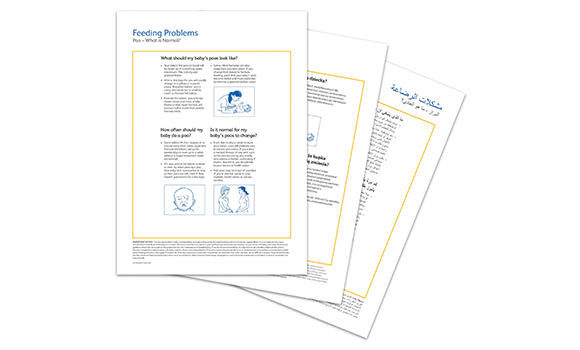| Shaping the future health of babies |
| To ensure future mailings from SMA® Professional reach your mailbox, add smaprofessional@smaprofessional.msgfocus.com to your safe sender list. |
| Email not displaying properly? Click here to view in browser |
 |
| |
| |
Dear [*data('forename') || 'Healthcare Professional' *],
Welcome to the May edition of our eNewsletter, aimed to keep you updated with the latest news in infant nutrition.
This month we will be talking about colic and its management in babies. To support you in your conversations with parents, we have unbranded helpsheets available on our website. Finally, we will be talking about our SMA Comfort formula, an easy to digest infant milk specially designed for babies experiencing tummy troubles.
Kind regards,
The SMA® Professional Team |
| |
 |
| |
|
|
 Colic in babies Colic in babies |
| |
Colic is described as repeated episodes of excessive and inconsolable crying in an infant that otherwise appears to be healthy and thriving. It is thought to affect up to one in five babies, although the condition is not well understood1,2.
The cause or causes of colic are unknown, but a number of theories have been suggested1. One theory is that abnormal intestinal microflora may cause gas production, gut dysfunction, indigestion or a temporary sensitivity in the gut to certain proteins and sugars found in breast and formula milk3.
Colic can be a very distressing experience for both parents and baby so it is important to offer support and advice for parents. Scroll down to find our helpsheets on colic. |
| |
 |
| |
 |
| |
 |
| |
 Helpsheets available for you Helpsheets available for you |
| |
To support you in your conversations with parents, we have developed unbranded helpsheets in 7 different languages for you to download and share.
Topics covering practical advice for breastfeeding and colic are included in these helpsheets. |
| |
 |
| |
 |
| |
 |
| |
|
|
 SMA® Comfort – Easy to Digest Infant Milk SMA® Comfort – Easy to Digest Infant Milk |
| |
Tummy troubles, such as colic, can be distressing for both parents and baby. SMA Comfort is an easy to digest, nutritionally complete infant milk. It is suitable from birth and is specially designed for healthy babies experiencing tummy troubles.
To aid digestion, SMA Comfort has been modified in 3 ways:
• Partially hydrolysed, 100% whey protein to aid digestion4
• Reduced lactose to help minimise crying and wind5
• SN-2 palmitate enriched fat blend to promote softer stools6 |
| |
|
|
|
 |
| |
 |
| |
|
|
 |
| |
® Registered Trademark.
IMPORTANT NOTICE: The World Health Organisation (WHO) has recommended that pregnant women and new mothers be informed on the benefits and superiority of breastfeeding – in particular the fact that it provides the best nutrition and protection from illness for babies. Mothers should be given guidance on the preparation for, and maintenance of, lactation, with special emphasis on the importance of a well-balanced diet both during pregnancy and after delivery. Unnecessary introduction of partial bottle-feeding or other foods and drinks should be discouraged since it will have a negative effect on breastfeeding. Similarly, mothers should be warned of the difficulty of reversing a decision not to breastfeed. Before advising a mother to use an infant formula, she should be advised of the social and financial implications of her decision: for example, if a baby is exclusively bottle-fed, more than one can (400 g) per week will be needed, so the family circumstances and costs should be kept in mind. Mothers should be reminded that breast milk is not only the best, but also the most economical food for babies. If a decision to use an infant formula is taken, it is important to give instructions on correct preparation methods, emphasising that unboiled water, unsterilised bottles or incorrect dilution can all lead to illness.
References: 1. NHS Choices. Colic. 2014. Available at https://www.nhs.uk/conditions/colic/ 2. Benninga M and Nurko, S et al. Childhood functional gastrointestinal disorders: neonate/toddler. Gastroenterology 2016;150:1443-1455 3. Lehtonen L et al. Intestinal microflora in colicky and noncolicky infants: Bacterial cultures and gas-liquid chromatography. J Pediatr Gastroenterol Nutr 1994;19:310–4. 4. Billeaud C et al. Gastric emptying in infants with or without gastro-oesophageal reflux according to the type of milk. Eur J Clin Nutr. 1990; 44: 577-83. 5. Growth and safety in term infants fed reduced protein formula with added bovine alpha-lactalbumin. J Pediatr Gastroenterol Nutr 2004; 38: 107-6 6. Yao M et al. High 2-palmitate and oligofructose in lower protein alpha-lactalbumin-enriched term infant formula: effects on stool characteristic and stool composition. J Pediatr Gastroenterol Nutr 2010; 50 (Supple. 2): PO-N-444. |
| |
 |
| |
|
|
To ensure future mailings from SMA® Professional reach your mailbox, add smaprofessional@smaprofessional.msgfocus.com to your safe sender list.
Contact SMA® Nutrition | Terms & conditions
This email is intended for residents of the UK
Unsubscribe |
| |
| ZTC3064/05/18 |
|
|
|
|
|